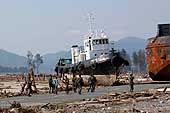I spent this p ast week at the International Labor Organization (ILO) in Geneva, Switzerland participating in the tripartite committee that crafted guidelines for the medical examination of seafarers. While it is often easy to get lost in the weeds when creating these sorts of documents by committee, it was clear from the start that these particular guidelines will have a meaningful impact on the working lives of seafarers. To the credit of the ILO, the organization facilitated interaction among representatives from flag states, ship owners, and seafarers. This is no small achievement.
ast week at the International Labor Organization (ILO) in Geneva, Switzerland participating in the tripartite committee that crafted guidelines for the medical examination of seafarers. While it is often easy to get lost in the weeds when creating these sorts of documents by committee, it was clear from the start that these particular guidelines will have a meaningful impact on the working lives of seafarers. To the credit of the ILO, the organization facilitated interaction among representatives from flag states, ship owners, and seafarers. This is no small achievement.
The ILO is the only United Nations agency with government, employer, and worker representatives. This tripartite structure makes the ILO a unique forum in which the governments and the social partners of the economy of its 183 Member States can freely and openly debate and elaborate labor standards and policies.
In 1919 the ILO Constitution was drafted by the Labour Commission set up by the Peace Conference, which first met in Paris and then in Versailles. The Commission, chaired by Samuel Gompers, head of the American Federation of Labour (AFL) in the United States, was composed of representatives from nine countries: Belgium, Cuba, Czechoslovakia, France, Italy, Japan, Poland, the United Kingdom and the United States. The overarching idea in creating the ILO was that lasting peace around the world can only be accomplished if it is based on social justice. My, how times have changed.
Back then the American labor movement led the charge to improve working conditions around the globe. Today the states in our Union unabashedly attempt to reduce and eliminate the rights and benefits of our workers at home, as seen this past summer in the Wisconsin, Indiana, Ohio, and Washington state governments, just to name a few. Even now the attacks increase as meaningful discourse continually gives way to political hyperbole that blames unions for the terrible economy in the U.S. The most ironic aspect of today’s America is that the citizens who decry unions are the same people who have been able to prosper, provide for their children, and secure comfortable retirements because of groundwork laid by unions so long ago. How quickly we forget.
Given the current sentiment in the U.S., imagine how refreshing it was for me to spend time at ILO, where they continue the effort led by Samuel Gompers in 1919 and strive literally around the world to improve safety and labor standards for workers everywhere. It is possible that America may no longer be a country where we care enough about our citizens to earnestly discuss how we can help and protect those most vulnerable when they face their most difficult moments. We as a country may have lost sight of the original American values of helping one another so that we all can prosper and continue to grow as a nation. But at least America helped, with others, plant the seeds of worldwide social justice at the ILO many years ago that now improve the lives of working people everywhere. Perhaps one day soon the ILO can remind America of the legacy we left them and help us remember who we once were.
